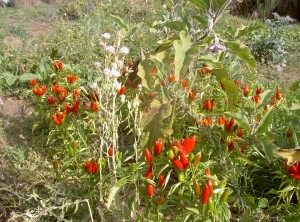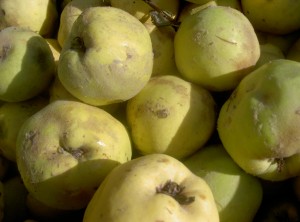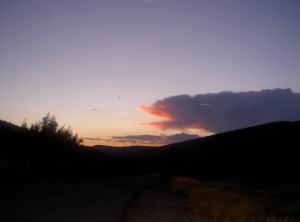This is part of a series of posts where we ask one of our visitors to say a few words about their stay. Ollie volunteered with us in 2015, and this is the blog post he wrote about his stay.
“I went to the woods because I wished to live deliberately, to front only the essential facts of life”
Henry David Thoreau, Walden

Hemmed high in the Portuguese mountains, in the less-traveled and lesser populated hills between Beira Litoral and Estremadura, is Casalinho; a farm, a small holding, part-entrepreneurial, part-communitarian, a micro project in rural sufficiency and organic sustainability. The homeowners and hosts, Andrea and Jeroen, of English and Dutch provenance, welcome volunteers and fellow travelers all year round with open arms, humour, grit, irony, admirable patience and an almost-encyclopedic knowledge of the horticultural, the agricultural, and the ecological. The volunteers, temporary co-habitants – a multi-national, peripatetic, multi-lingual convocation, all walking separate paths, meeting and living and working together by happenstance – come to learn, contribute, eat, drink and laugh, then leave richer than when they arrived.
All this in the most alluvial, edenic surroundings: curving around the farm in all directions are smoothly meandering hills of Maritime pine, the matte valleys fissured by looming, mesmeric ridges of Cretaceous granite, strewn across the gulches like the moss-covered spines of ancient behemoths. The roads lace the mountainsides like capillaries, curling up the slopes like unraveling rope – often at unsettling cambers, at inclines that exhaust even the sturdiest of engines – then cutting through the hilltops leaving steep escarpments of chiseled, polytonal slate; fragile and jagged mosaics of ash, rust and sorbet talus; shale, mudstone and clay compressed since Tortonian times into sharp, splintering rock. The farm itself extends east of the large, three-story, beautiful stone quinta, the land separated into an orchard, small vineyard, fields and, below the house, a grassy terrace and vegetable garden; across the road and opposite the driveway is the campsite, the leveled plots extending uphill into the forest.
From the simple confines of a tent or caravan, the workday begins early with the sweetly melodic tones from the church bell in Aradas creeping around the hillsides. Even in the warmer, southern climes, the mornings at 800m can be cold, the sky either a light blueish jade, the moon still radiant before sinking from view, or thickly white with cloud, the eastward wind turbine barely visible, only its rotor tips slicing through the low-hanging mist. Before work: coffee, brewed with the encased fires of a ghillie kettle, a vital but frustrating task first thing, the frozen metal refusing to accommodate the initial licks of flame, the volunteer sleepily blowing embers while rolling a cigarette with numb fingers. Then, after an oaty breakfast, to work.
 The resident goats – masticating machines with insatiable appetites – need feeding daily, both with freshly cut grasses and the tougher forest shrubs – broom, heather and carqueja; grass cutting of course serving the secondary function of forest fire prevention, the omniscient threat of total ruin mitigated somewhat by a slender scythe and humble bucket. Following these daily labours, the remaining work varies in delicacy, creativity, thought, repetitiveness and raw energy required. It might be weeding in the colourful serenity of the garden, mulching to repel said weeds, building a new tire bed for herbs, fruits and flowers, constructing a hot compost pile to enrich the thin, deficient soil endemic to similar latitudes, or digging for clay with a pickaxe, muscles aching, sweat dripping as a patina of fine red dust settles on every surface. Whichever task is chosen or assigned, it will likely be done to the choral fugues of birds, the querulous bleating of goats and the guttural squawks of the cockerel. All jobs, to the punctilious worker, have their simple pleasures to be found; in weeding, for example – the damp alkaline smell of the soil, the exploratory worming of fingers to gauge root depth and the terse satisfaction as the weed is tugged loose, root structure intact. Or in composting – the steady layering of manure and grass, the gradual growth in volume and height and, when turning the pile, the vinegar smell of putrefaction, a sign of bioactivity, confirmation of organisms busily augmenting the biomass, endless forms in a creative-destructive dance, the clamour of microbial life microscopically astir. And all jobs share the same, ever present downside: Rubus Fruticosus.
The resident goats – masticating machines with insatiable appetites – need feeding daily, both with freshly cut grasses and the tougher forest shrubs – broom, heather and carqueja; grass cutting of course serving the secondary function of forest fire prevention, the omniscient threat of total ruin mitigated somewhat by a slender scythe and humble bucket. Following these daily labours, the remaining work varies in delicacy, creativity, thought, repetitiveness and raw energy required. It might be weeding in the colourful serenity of the garden, mulching to repel said weeds, building a new tire bed for herbs, fruits and flowers, constructing a hot compost pile to enrich the thin, deficient soil endemic to similar latitudes, or digging for clay with a pickaxe, muscles aching, sweat dripping as a patina of fine red dust settles on every surface. Whichever task is chosen or assigned, it will likely be done to the choral fugues of birds, the querulous bleating of goats and the guttural squawks of the cockerel. All jobs, to the punctilious worker, have their simple pleasures to be found; in weeding, for example – the damp alkaline smell of the soil, the exploratory worming of fingers to gauge root depth and the terse satisfaction as the weed is tugged loose, root structure intact. Or in composting – the steady layering of manure and grass, the gradual growth in volume and height and, when turning the pile, the vinegar smell of putrefaction, a sign of bioactivity, confirmation of organisms busily augmenting the biomass, endless forms in a creative-destructive dance, the clamour of microbial life microscopically astir. And all jobs share the same, ever present downside: Rubus Fruticosus.

